Mulgrew Doesn’t Want Us Demanding Changes to Tier 6 Pensions at the Negotiating Table Because It’s “ILLEGAL”: He Lied to Us, Again
We need to fight like hell to Fix Tier 6 pensions and it begins with changing the framing
Sometimes as delegates sitting in the DA meeting hall at 52 Broadway, it’s not always easy to catch the nuances and spin within the dizzying mishmash of Michael Mulgrew’s never-ending presidential reports.
But, when Mulgrew got to the Tier 6 update at the most recent February delegate assembly, our ears perked.
The plight of most active members who have been saddled by the tonnage of an inferior Tier 6 pension, since 2012, weighs heavily on the minds of all of us who are tired of seeing our hard fought and hard-worked benefits – pension and healthcare – continue to diminish pathetically.
It wasn’t so much that he shared yet another BIG LIE regarding our benefits, but it was what he paternalistically and implicitly instructed us to do with that lie that captured the attention of some of us fighting for a better union and to fix Tier 6, sooner than later.
Mulgrew told us:
“I want you to make sure all the members understand this. We do not negotiate pensions. Negotiating of a pension in the state of New York is illegal. You lobby for pension changes.”
After his mini-lesson on how a bill becomes a law, he added:
“We will change this [Tier 6] but I need everyone to understand the process. I don't want our members running around saying: ‘You know we have to demand this’. This is a lobbying effort. Okay, it took us over 20 years of lobbying to fix tier four.”
Look. We’re all well familiar with New York's Tier 6 pension system crisis which primarily revolves around greatly reduced benefits, increased employee contributions until age 63, longer vesting periods experienced by many, working up to 4 decades until one is eligible to receive a full pension, and serious challenges in recruitment and retention of public employees, as a result.
Yet, if you really want to see how bad it is, be sure to check out Ben Morgenroth’s presentation about this crisis.
And, when our union president who was a chief architect behind the diminishment of our healthcare benefits essentially says: “Trust me, wait at least 10 more years, just send in your COPE money and we’ll get Tier 6 pensions fixed up in Albany. It’s the best we can do because demanding more, like negotiating pension benefit changes, is illegal.”
It’s incumbent of us to double take, express healthy skepticism, ask questions and fact check.
We simply can’t afford to wait, Mr. Mulgrew. Or trust you. Literally.
And why are you misleading us about what we can do? No, we won’t spread another BIG lie for you.
Negotiating Pensions Is Not Illegal. Its Within our Legal Rights and Responsibilities
Is it really illegal to negotiate changes to our pensions in the fight to fix Tier 6 as Mulgrew claims?
Are pension changes really not subject to collective bargaining as we find in union literature regarding the FIX TIER 6 campaign?
The short answer: Absolutely not.
And to say otherwise, willfully, is no longer misinformation coming from our union leadership, but rather, it is disinformation.
The Facts:
Fact #1: Negotiating Pensions is a Mandatory Subject of Collective Bargaining - The New York City administrative code plainly lays out our legal rights and responsibilities as a union, or a certified employee organization. It describes the scope of the City and union(s) mandatory subjects of collective bargaining. It tells us both parties must address and can negotiate various items, such as: wages, working conditions, healthcare and welfare fund benefits, uniform allowances and more … and yes, our pensions.
Mr. Mulgrew, our top designated negotiating representative, seems to either not be properly trained regarding the scope of our collective bargaining powers, or is hoping we, the members, don’t demand all we can and should at the bargaining table.
Receipt #1 - NYC administrative code, section § 12-307 Scope of collective bargaining; management rights states:
Fact #2: New York state’s Taylor labor law provides clear provision on how to negotiate regulated items like pensions
New York’s Taylor law is the defining state labor law that tells us all of the do’s and don'ts for collective bargaining between public employees and municipal/state authorities.
It contains a provision that stipulates that when both negotiating parties collectively exercise their rights to make changes to such things like pensions, that may require state approval or legislative action, there needs to be a clearly posted disclaimer. The Taylor law says that the disclaimer needs to read that state approval is pending for the agreement and not effective until this is finalized.
Moreover, these types of legally negotiated agreements are called contingent agreements because they are contingent on required approval from a legislative/regulatory body. In addition, both negotiating parties commit to work together to lobby for the approval.
What’s even odder about Mulgrew’s most recent canard, is that when I asked Mulgrew to clarify his falsehood during the DA question period by sharing with him some of the real facts, he acknowledged the existence of these contingent agreements. He also offered up that very often the legislators like it when both parties come to Albany with the same ask for pension reform.
Why is this the case? One might ask. Because, likely, lawmakers know there’s going to be little pushback against the legislative action from these very powerful and influential interests. Also, legislators might perceive it as acting for the common good.
Receipt #2 - NYS Taylor Law, section §204-a Agreements Between Public Employers and Employee Organizations reads:
Some Historical Precedents of Local Unions Negotiating Changes to our Pensions
Mulgrew has a BIG problem when he claims that negotiating pensions is illegal. You see, we’ve done it before.
We, and the city’s other unions, have historically used our collective power to craft contingent labor agreements in our negotiations with the City that seek changes to elements of our pensions.
Mr. Mulgrew, are the following instances surrounding negotiations to change our pensions ILLEGAL?:
2007: UFT’s Weingarten and Bloomberg negotiated 25/55
Probably the most recognizable negotiation resulting in a contingent agreement seeking a major change to Tier 4 pensions, happened in 2007. Then UFT president, Randi Weingarten, and former Mayor Bloomberg, banged out a deal where Tier 4 members could opt to retire 5 years earlier in exchange for a pilot program that Bloomberg wanted to try. He wanted to try merit pay for teachers who showed increases in their students’ state test scores.
Most of us know this pension change as 55/25. Typically, teachers cannot get their full pension without 30 years of qualifying public service employment. Many Tier 4 teachers jumped on this opportunity to collect a full pension, if they were at least 55 years old and had accumulated 25 years of service.
In the final analysis, this deal happened because of very intentional negotiations at the table —with some horse trading. Initially, Randi received some criticism within our ranks for conceding to an unpopular merit pay offer. But, ultimately, the union later pushed back on the pilot program when it was finally implemented while walking away with an improved, enduring benefit for Tier 4 members.
Hard to deny that this was mostly a “W” for Randi and members.
But does Mulgrew really think the negotiated 55/25 deal that resulted in a pension change was illegal? Randi or members should not have made and ratified these types of demands through collective bargaining?
2006: DC37 and Bloomberg flirted with major pension changes for new city workers which could have set the pattern for other unions
Some of the seeds for a Tier 5 and, what is now Tier 6, germinated during the early Bloomberg administration.
Even Mayor Bloomberg knew that he could bring his pernicious, austerity-driven dream to diminish our city pensions by seeking to create a “cost-saving” fifth tier for new city workers to the negotiation table. How? Because both parties have this collective bargaining right according to the law.
Bloomberg, unlike Mulgrew, knew it wasn’t ‘illegal’ to address pensions when his chief negotiator and city labor commissioner, James F. Hanley sat down with DC 37 for contract talks in 2006.
Hanley astutely proposed pension changes to position Bloomberg’s broader strategy for a new tier. According to a 2006 New York Times article, Hanley “called for increasing the minimum retirement age for future District Council 37 workers to age 62 from the current 57. He also proposed requiring that future workers pay 3 percent of their wages toward their pensions every year until retirement; current workers pay 3 percent for only their first 10 years.”
Among other proposed changes, Hanley called for “new city workers to be vested in the pension plan after 10 years of work, up from the current five years.”
If any of this sounds familiar it’s because some of these proposed changes are the same or very similar to some of the original Tier 6 terms and conditions.
The same article tells us that these overtures were seriously being considered in 2006. It states:
“Union leaders hinted that they might entertain a less generous pension tier for new workers, but in return they wanted a significant wage increase and improvements in pensions for current workers.”
Ultimately, various factors stalled Bloomberg’s diabolical plan. Many of the city unions began to push back against accepting his demands for pension changes as Bloomberg tightened up the purse strings during the recession years and then refused to settle contracts with any of the city’s 152 labor unions.
But, it’s not far-fetched to say that some of the inferior pension changes that newer workers experience now with Tier 6 were introduced and conceived at the negotiation table, along with some union leaders willing to sell out and accept givebacks when lured with instant gratification.
It can also be said that the legislators in Albany are not the progenitors of many of these pension changes. Rather, they are most often the midwives.
If you are asking: Tier 5 was short lived from 2010 to 2012, ushering more pension cuts. Ultimately, Bloomberg worked with Cuomo, who introduced Tier 6 in 2012.
1995-2000: MLC Economic Agreement with City
The following screenshot is from the Municipal Labor Committee, (the coalition of city unions) 1995 to 2000 economic agreement with the City of New York. This agreement created a Joint Labor Committee to explore and negotiate possible changes to city pensions. It, too, understood that any contingent agreements would be brought jointly to the state for approval.
1990: UFT Contract and Dinkins
In 1990, the UFT and former Mayor Dinkins agreed to a rare 1 year contract with a 5.5% yearly raise. That’s a significant increase compared to today. It was partially funded with some creative financing by revising earnings calculations from the teacher pension fund. While little is written about the impact of this approach, this is yet another example of a significant change to our pensions that was collectively negotiated by our union and the City.
“Approvals needed to enact the contract include votes by the pension fund trustees and the State Legislature on the new pension financing . Until those approvals are given, the contract should be considered a contingent agreement.”
Questions about the wisdom of this type of financing agreement aside, this does show a willingness by former UFT President, Sandra Feldman, to pursue changes to our pension at the bargaining table.
Some Questions for Mr. Mulgrew
Again, Mr. Mulgrew, were all of these instances of negotiations for pension changes illegal?
Maybe your mistruth is just a gross oversimplification? Maybe it’s designed to discourage us from asking you to really fight for us using our collective bargaining power; or maybe accepting the facts forces you to be more creative in labor talks?
Maybe you’re scared or unsure you can’t deliver on a contingent agreement to improve Tier 6 and might be pressured to step up with collective job action?
Maybe you’re not up for the job?
(*Purging competent union organizers that disagree with you AIN’T IT, either.)
The Bottom Line: A Call to Action
I grew up the son of a Pentecostal pastor. As a kid sitting on the pew, we were taught not to bear false witness and that a lying tongue is detestable. Today, I think most of us, religious and non-religious, believe we need to be honest in our transactions and try our best to live up to this standard. Most definitely, within our union family.
Honesty, along with transparency, fosters trust and builds solidarity. We can’t continue telling our members they can’t demand pension changes at the table because it’s not legal.
The framing needs to change.
What we need to do is fight like hell to fix Tier 6. This crisis is upon us, with our livelihoods, families, future and profession hanging in the balance.
Our union is a mighty sleeping giant, as Arthur Goldstein often says. We aren’t at our most powerful just collecting political donations, paying lobbyists to lobby in Albany or wearing Fix Tier 6 merch for photo ops. While this might help in some ways, also. But, we’re at peak performance when we take matters into our own hands, organize and stand by our demands at the table.
We must be better and do better. Here is our call to action:
And when elections come along like this coming spring, we must vote for candidates who are offering specific and meaningful demands to fix Tier 6.
In May, vote for Ben Morgenroth for Teacher Retirement System (TRS) trustee. More details about this vital election will be shared soon.
Vote for chapter leaders who support fighting and organizing your chapter around Fixing Tier 6, improving our overall pension and healthcare benefits, and are responsive to the important issues in your local school chapter.
Retirees will be also voting for a new chapter leader in their RTC elections. Be on alert for the election slate that Retiree Advocate will be announcing very, very soon. They are committed to stopping this madness. Ending the diminishment of our pension and healthcare benefits. They stand firmly against Mulgrew’s Medicare Dis-Advantage plan.
Vote Mulgrew’s Tom Murphy out!
Tell, Mulgrew, and his Unity caucus leadership, we’re taking our union back.
*** Correction update(s): Sandra Feldman, not Albert Shanker, was the UFT president who negotiated a pension change to help finance the 1990 contract. She was UFT president from 1986-1997.



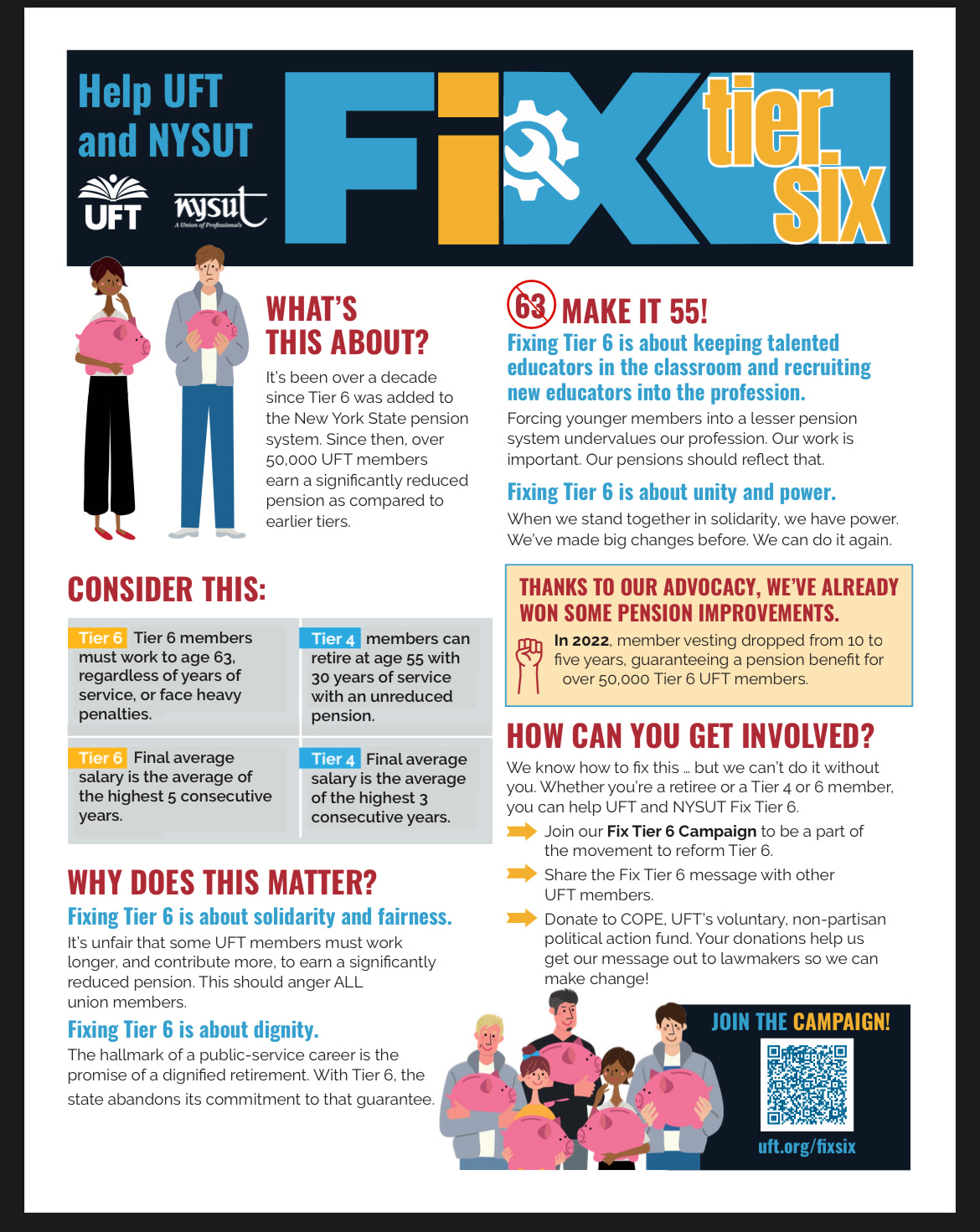
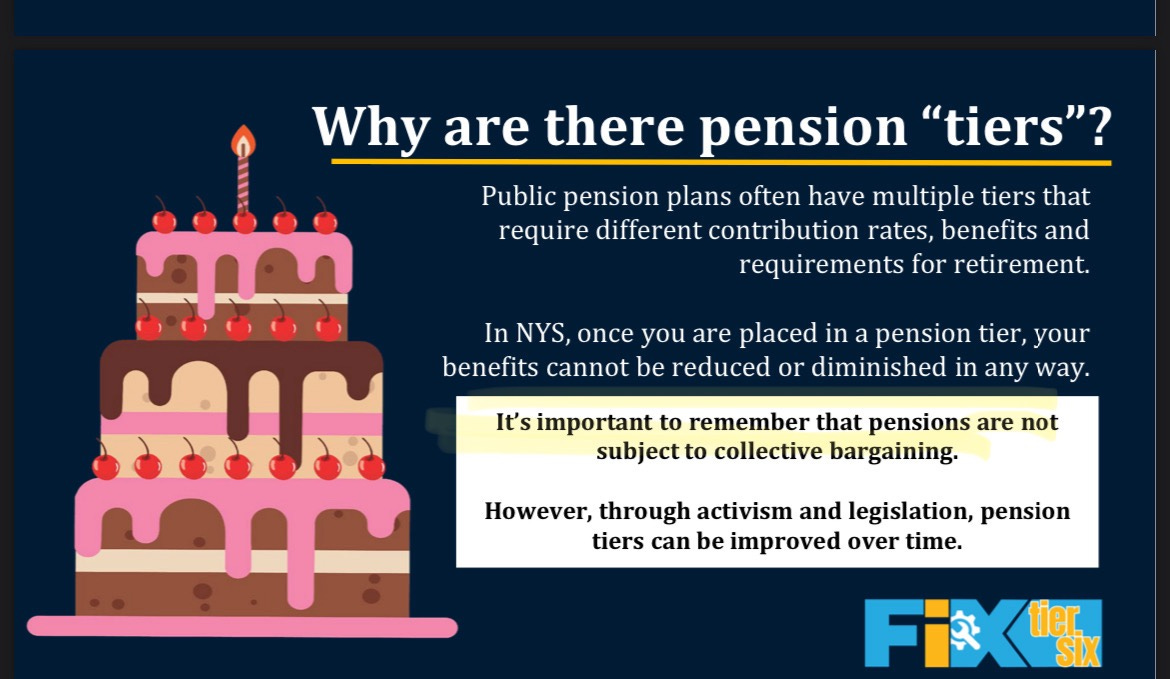


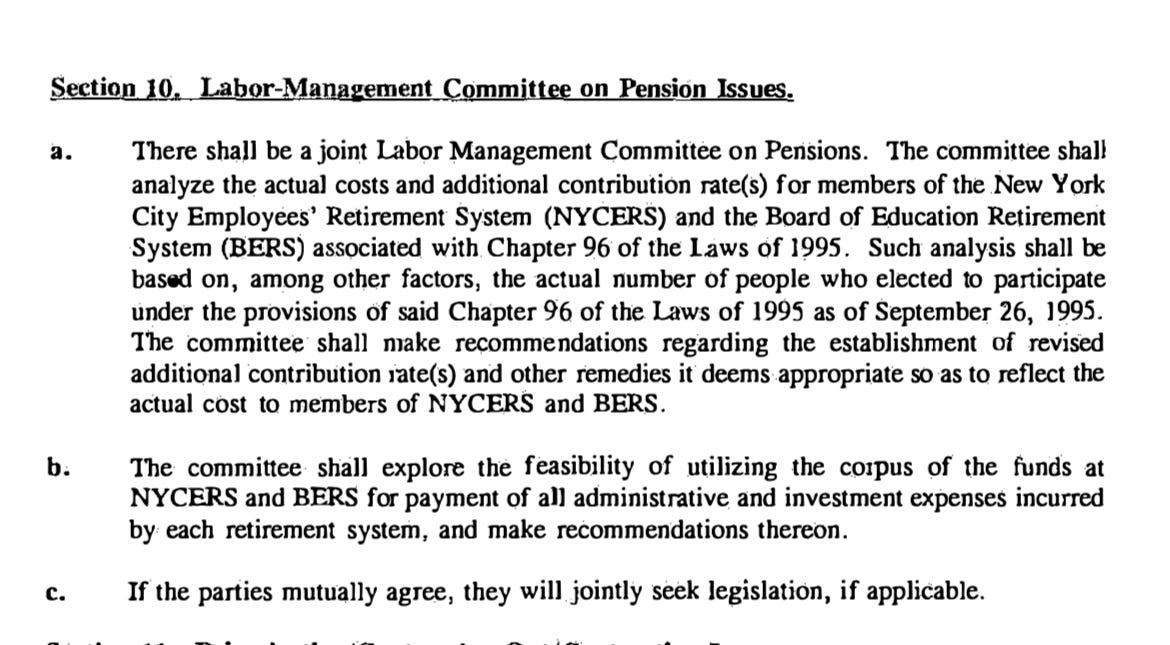
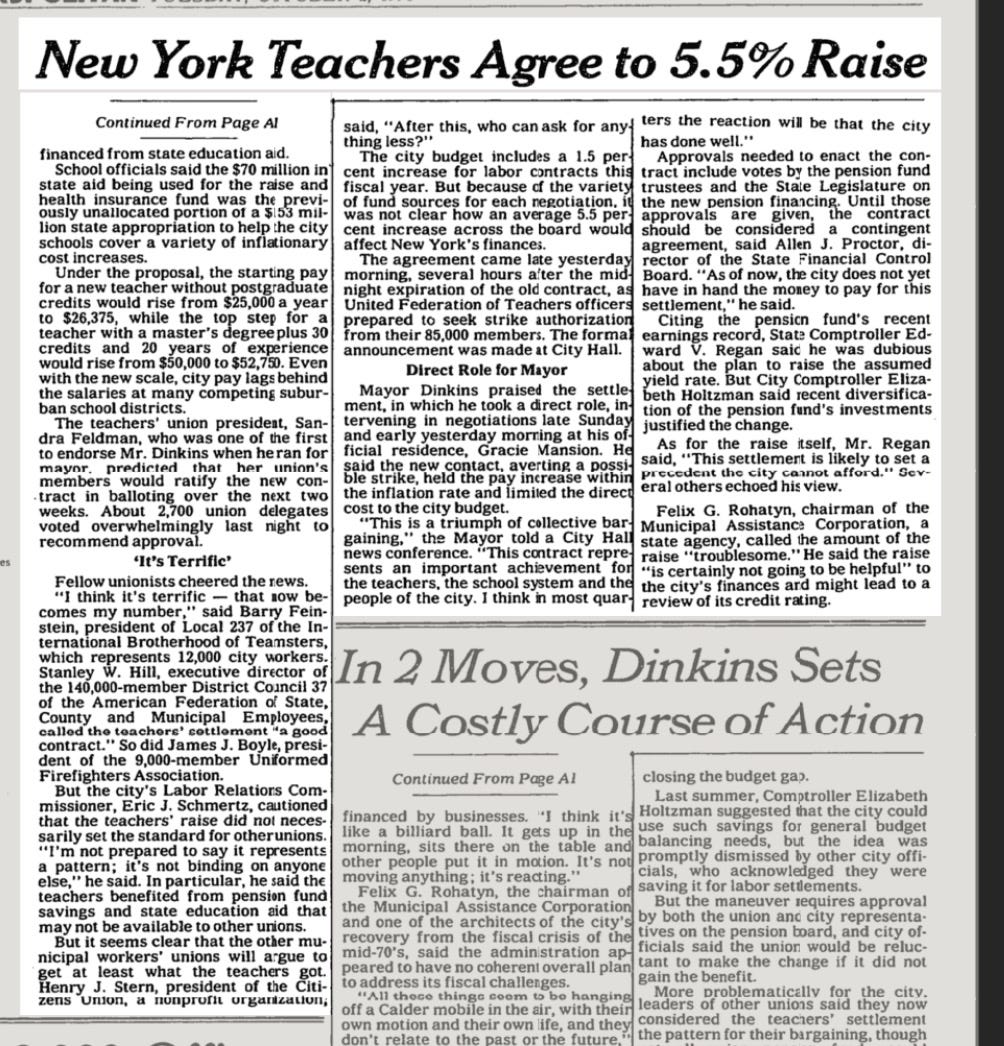
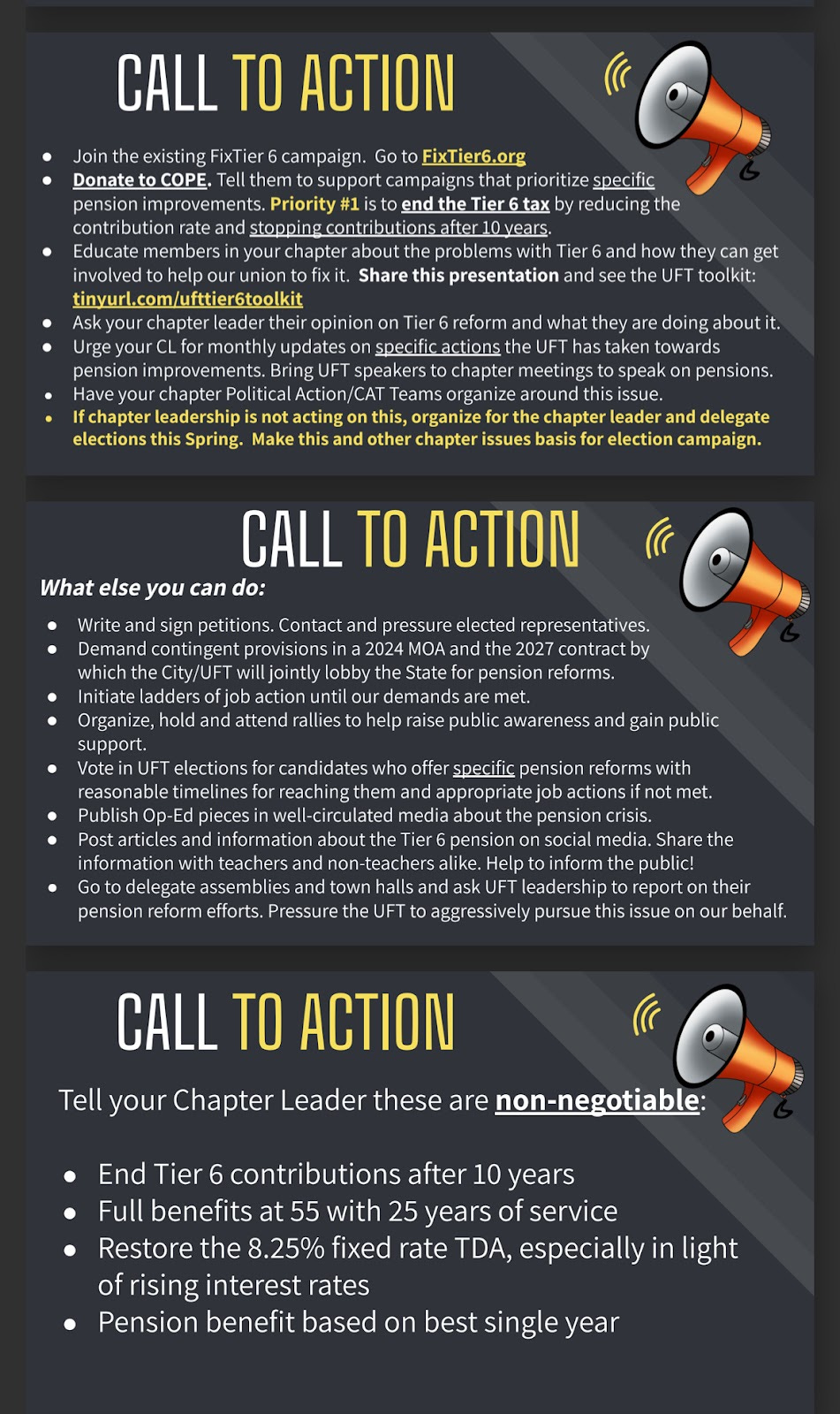
Yes! He doesn’t want you to know you can collectively bargain with some of these issues - it’s twofold. One he doesn’t really want you involved. Remember a few years ago he told the press that you elected him to make decisions. He doesn’t need to come back to all of you to ask what your opinion is. If you get involved, he can’t do what he wants.
And two. He doesn’t want you to know that the Uft leader ship sold off your pension for raises. The exact same thing he’s doing today with healthcare. You have to keep perpetuating the lie to cover up the things that you did wrong.
Really excellent research and very important information. I just want to say a word about one part of this piece of which I have personal experience: the 1990 contract with the 5.5% raise. The Unity leadership was politically close to Dinkins and had been important in getting him into the mayoral position. The raise was a result.
However, we didn't get that raise. At the end of 1990, only a few months after the contract was ratified, the City came back and said it was broke and couldn't give us the raise unless there were lay offs. The UFT leadership (BTW, the president at the time was Feldman not Shanker) worked together cleverly at the members' expense. They agreed that the raise could be broken into two parts and deferred for 2 - 3 years in exchange for no lay offs. The members would vote on this new contract provision.
You cannot imagine a better way to divide the rank and file and put us at each others' throats. The mainly new teachers whom would be laid off if the new deal were rejected were personally informed. A 2nd year teacher at the time, I was among them. Our more senior colleagues who had been so welcoming and helpful turned on us, as if we were trying to snatch the food from their babies' mouths. I will never forget the hurtful things they said to me.
Nevertheless, the change passed, no one was laid off, but the much-touted raises were delayed. The union leaders and the City together had deceived, manipulated and short changed us.